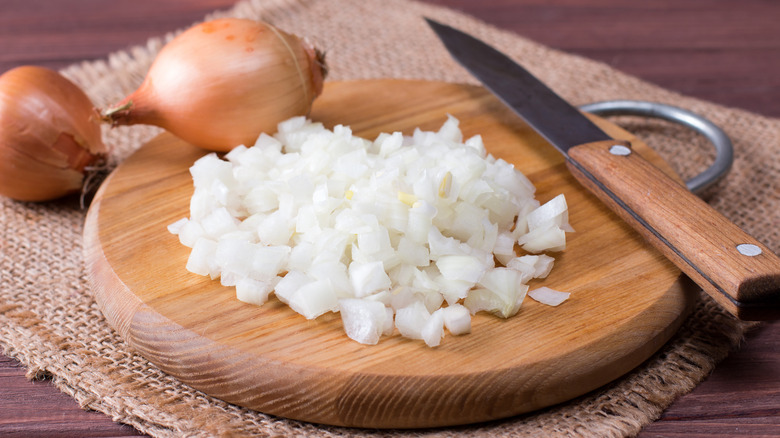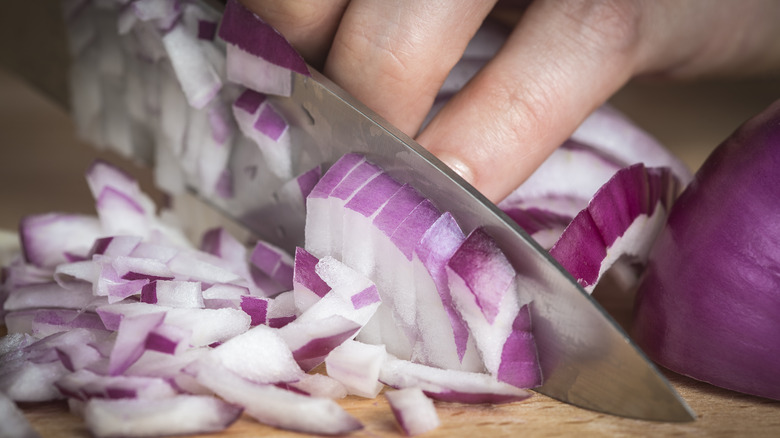Store Your Onions In The Freezer For Tear-Free Chopping
Nothing interrupts the joy of cooking more than the chore of having to chop onions. One minute you're in the zone sauteing mushrooms and mincing garlic — the next you're in agony with uncontrollable tears and burning eyeballs. While some are more sensitive to the onion effect, a degree of eye irritation is almost inevitable whenever chopping vegetables in the Allium family, especially yellow, white, and red onions, and shallots.
Fortunately, there are some kitchen hacks that can help mitigate the harsh reaction. Crying and pain don't have to get between you and your hydrating French onion soup ever again. One of the most effective ways to achieve tear-free chopping is to store the onions to be cut in the freezer. They only need to be in there for a short while for this to work, and if you get them all processed quickly, you may not even shed a tear.
Understanding why onions make your eyes sting can help explain why the freezer trick works. When you cut into an onion, its self-defense mechanism kicks in and causes a chemical reaction, which in turn releases a gas that interacts with the liquid in your eyes and creates a type of sulfuric acid. Your eyes respond with their own defensive maneuver, which is to flush out the irritant with watery tears. Freezing onions before cutting them slows down the release of these chemicals, giving you a chance to get your chopping done before the gas reaches your eyes.
Don't cry; dry your eye
To ensure that the freezer prevents another crying episode when you next chop an onion, there are a few tips you should follow. First, before freezing your onions, do not remove the outer peel or skin. Doing so will begin the process of the onion releasing its caustic chemicals, so leave the peeling until it's time to chop. Next, put your onions into the freezer for up to 30 minutes before you need to use them. This won't be long enough to fully freeze them but will be enough to chill and stall the bothersome chemicals. Think of it as stunning them temporarily so that they can't react as quickly — giving you just enough time to chop and start cooking before the tears can start to gush.
Unlike the many onion tear-stopping myths that float around online and since time immemorial, this one really does work, and has the science to back it up. While putting your onions on ice doesn't guarantee an entirely weeping-free slice-and-dice session, it can give you a head start. Other suggestions such as holding a slice of bread in your mouth, breathing through your mouth, or chewing gum while you chop onions are mostly ineffective timewasters — while others, such as cutting onions underwater or near an open flame, are potentially dangerous.
How to cut through onion skin without the sting
Along with freezing, you might also consider a knife upgrade to prevent onion tears. A sharp knife is key to prepping alliums without automatically bawling. A dull knife will crush the onion's cells as it pushes through, and this damage releases more of the gas. A sharp chef's knife, on the other hand, will give a clean cut that won't tear or smash the cells, resulting in less of the eye-reddening fumes.
When you're ready to chop into your freezer-chilled onion, try to avoid cutting directly into the root end of the bulb, which is where the cry-inducing compounds are concentrated. Working in a ventilated space helps too, so open those windows if you have them. Alternately, running your stove's exhaust fan can pull some of the irritants out of the kitchen, and turning on a table fan aimed to blow away from your face may help to keep the chemicals from reaching your eyes.
The only surefire way to avoid having your eyes affected by cut onions is to keep them from being exposed at all. That's where onion goggles come in handy. While they might make you look like a race car driver or deep-sea diver, they work by creating a seal all the way around your eyes, usually with a soft layer of foam, which keeps outside air from getting in. Combine these with a sharp knife and a just-chilled onion to stop tears in their tracks.



